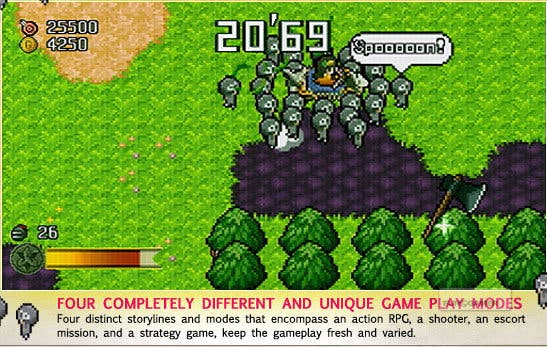Half-Minute Hero
30 seconds of fame.
Half-Minute Hero is a two-fingered salute to anyone who's ever complained that the Japanese RPG is too long and tedious to be worth the bother. From the moment your hero leaves his pastoral village to when he lands a death blow upon the world-threatening overlord, the game distills the traditional 60-hour play arc of Japan's interactive fantasy epic into 30-second speed-run concentrate.
It may be a single-note joke - building a frantic dash against the clock in the gaming genre least suited to the task - but it's an excellent joke nonetheless. Moreover, in its self-assured execution and endlessly inventive subversion of cliché, Half-Minute Hero succeeds in becoming a masterful reinvention of that which it parodies, simultaneously celebrating the form while overhauling the function of one of gaming's oldest templates to create something fresh and imaginative.
Like the Reduced Shakespeare Company, Half-Minute Hero appropriates the language and aesthetic of its influence (in this case, the 8-bit JRPG) but trims away the bulk. The result is a conveyor belt of ADHD-friendly bites of play. Entire plotlines are snipped through like shorthand synopses; random battles explode and vanish like double-time fireworks while your character levels up in the blink of a transition screen.
The need for all this hurry is pressing: in 30 seconds' time an evil overlord is set to whisper a spell to end the world. The aim (at least within the core game mode) remains resolute throughout: race from your home village to the overlord's castle and defeat him within this improbable time limit in order to save the world.
While traditional random battles interrupt your progression on the world map, you have no direct control over combat. Instead, your character careers across the battle screen from left to right, bumping heads with enemies until one or the other's health is depleted. Post-battle there's no results screen. Any experience points gained are added to a hidden total and, if you earned enough, level your character up, ensuring the next battle is faster won.

An unflinching digital countdown timer is constantly stamped on the screen, revealing how many milliseconds are left till global annihilation, adding a near relentless pressure to proceedings. Time pauses only when you enter village safe havens, where you can replenish health, purchase better armour and weaponry or gather clues for how to reach the overlord's castle. Step outside again, and the mere suggestion of sloth is enough to invoke the apocalypse.
To begin with, tactics primarily revolve around balancing levelling on the world map with leaving enough time to get to the castle and defeat the overlord. Misjudge your timings and you either won't be strong enough to defeat the overlord, or you'll run out of time before you can reach him. The game's broken into missions, each one presented as if it's a complete JRPG title. As a result, once you've defeated one overlord, the game's end credits roll (45 seconds after you first booted the game up) and you move on to the next mission, billed as a numbered sequel in the Final Fantasy/Dragon Quest tradition.
As the game progresses, the barriers that stand in your way between village and overlord become more numerous and convoluted. For example, you might need to take a detour into a sacred cave in order to retrieve a Ring of Valour in order to prove your worth to the dwarfish people who, once onside, will grant passage to the castle. As a result, the focus soon tightens upon time management, as you race from clock-stopping village to village, gathering clues and directions before executing your hastily prepared plans within the limit.
Of course, as stages begin to gain complexity, so the 30-second time limit becomes unworkable. Here the game introduces the Time Goddess, a benign deity who is happy to turn back the clock for you for a fee. At most villages in a mission you can pay the Goddess to reset the clock, although the cost of doing so next time dramatically increases on every occasion you do. As your money doesn't carry over from mission to mission, you must manage resources plundered from battling monsters between upgrading equipment and buying back valuable seconds, and striking the perfect balance is the key to high scores.



